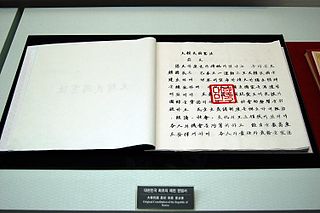
The president of the Republic of Korea, also known as the president of Korea, is both the head of state and head of government of the Republic of Korea. The president is directly elected by the citizens of the Republic of Korea and pledges to execute the duties of their office, chief among others "to defend the State, pursue peaceful unification of the homeland." The president leads the State Council, is the chief of the executive branch of the national government and the commander-in-chief of the Republic of Korea Armed Forces.
A four-part constitutional referendum was held in Ukraine on 16 April 2000. The referendum was called by President Leonid Kuchma, and asked voters whether they approved of four amendments to the constitution that would increase the powers of the President and introduce an upper chamber.

The Third Republic of Korea was the government of South Korea from December 1963 to November 1972. The Third Republic was founded on the dissolution of the Supreme Council for National Reconstruction that overthrew the Second Republic and established a military government in May 1961. Park Chung Hee, the Chairman of the Supreme Council, was elected President of South Korea in the 1963 presidential election.

The Fourth Republic of Korea was the government of South Korea from November 1972 to February 1981.

The Constitution of the Republic of Korea is the supreme law of South Korea. It was promulgated on July 17, 1948, and last revised on October 29, 1987.

A seven-question referendum was held in Belarus on 24 November 1996. Four questions were put forward by Alexander Lukashenko, the president of Belarus, on changing the date of the country's independence day, amending the constitution of Belarus, changing laws on the sale of land and the abolition of the death penalty. The Supreme Council put forward three questions on constitutional amendments by the Communist and Agrarian factions, local elections and the national finances.

A constitutional referendum was held in Chile on 11 September 1980. The proposed new constitution would replace the 1925 constitution, and was approved by over two-thirds of voters.
This list of presidential elections in the Philippines includes election results of both presidential and vice presidential elections since 1899 with the candidates' political party and their corresponding percentage.

A constitutional referendum was held in Russia on 12 December 1993. The new constitution was approved by 58.4% of voters, and came into force on 25 December.

A constitutional referendum was held in France on 5 May 1946. Voters were asked whether they approved of a new draft Constitution proposed by the Constituent Assembly elected in 1945.

Presidential elections were held in South Korea on 16 December 1987. They marked the establishment of the Sixth Republic, as well as the end of the authoritarian rule that had prevailed in the country for all but one year since its founding in 1948. They were the first direct presidential elections since 1971, as presidents had been indirectly elected by an electoral college dominated by the governing party in the intervening period.

The Constitution of Guyana is the highest governing document in the Republic of Guyana. It came into effect on October 6, 1980, replacing the constitution enacted in 1966 upon its independence from the United Kingdom. The current Constitution of Guyana contains 12 chapters that are further divided into 232 articles. It also contains a preamble and an oath. Since its 1980 enactment, it has gone through multiple amendments.

A constitutional referendum was held in Turkey on 7 November 1982. The new constitution was approved by 91% of voters, with a 91% turnout.

Presidential elections were held in South Korea on 27 April 1971. The result was a victory for incumbent president Park Chung-hee, who received 53% of the vote. Voter turnout was 80%. Within a year of his re-election, Park declared martial law and introduced the Yushin Constitution, which vested him with sweeping and near-dictatorial powers.

A constitutional referendum was held in South Korea on 17 December 1962. The new constitution was approved by 80.6% of voters, with a turnout of 85.3%.

A constitutional referendum was held in South Korea on 12 February 1975. The referendum was aimed at confirming the authenticity of the constitution, and was approved by 74.4% of voters, with a turnout of 79.8%.

A constitutional referendum was held in South Korea on 22 October 1980. The changes to the constitution were approved by 91.6% of voters, with a turnout of 95.5%.

A constitutional referendum was held in South Korea on 28 October 1987. The changes to the constitution were approved by 94.4% of voters, with a turnout of 78.2%.

A constitutional referendum was held in Haiti on 12 June 1918. Voters were asked to approve or reject a new constitution, which was imposed by the United States government. It was approved by 99% of voters, although less than 5% of the population voted.

A referendum on a new constitution was held in Puerto Rico on 3 March 1952. It was approved by 82% of voters. This was considered by many American and Puerto Rican politicians an affirmation of the new constitution of the island as an Estado Libre Associado, or Commonwealth, as proposed by legislation in 1950 by the United States Congress after negotiation with its political leaders. Puerto Rican nationalists question the meaning of the referendum, complaining that the only alternative offered was direct U.S. rule, and no choice of independence was offered. In 1980, the Supreme Court of the United States adjudicated that as a result of this referendum of 1952, the actual territorial status was not changed at all.
















